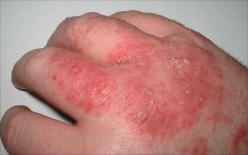Eczema is an inflammation of the epidermal or outer layer of the skin. It occurs in allraces and is characterized as a recurring rash on the skin. Some signs and symptoms include; inflammation, redness, itching, swelling and in some people lesions can occur. In dark skinned people it manifests as raised off-white colored marks on the skin that itch.

Photograph of typical, mild dermatitis (Photo credit: Wikipedia)
There are four main types of eczema: Atopic Eczema which is thought to be hereditary and affects families that suffer from asthma, Contact Dermatitis which occurs when a person comes in contact with either an allergen such as poison ivy, or an irritant such as detergent; the third main type of eczema is Xerotic Eczema which results from very dry skin, and finally Seborrhoeic Dermatitis (cradle cap) which resembles dandruff. Getting rid of eczema will depend on the type of eczema that you have, there is no generally accepted cure for it but various persons have found various methods to cure their own eczema, or at least control it; here are some of those methods.
Required Tools
- Hands
Required Materials
- Medication
- Anti-itch cream
- Moisturizer
- Vitamin D3
- Anti-fungal treatment
Instructions
Anti-itch creams such as hydrocortisone, or moisturizers are the most commonly prescribed treatments for eczema as dry skin can encourage eczema and make it unbearable; mild soaps can also be helpful as regular soaps and detergents are often too harsh for persons with eczema and serve to make the condition worse. There are medications that can be prescribed by a dermatologist for the condition, however these typically have side-effects such as thinning and weakening skin and therefore should be used with caution.
For Atopic Eczema, diet changes may be the best option for getting rid of the problem; atopic eczema has been linked to food allergies so finding out what you are allergic to and eliminating it from your diet might be the answer for you. Research also suggests that taking a vitamin D3 supplement can improve this type of eczema.
For Contact Dermatitis, the obvious remedy is to find out what allergens or irritants cause the problem and avoid them as much as possible; Xerotic Eczema can be improved by applying a moisturizer to your skin, and making sure it is always moisturized, especially in winter months when the condition tends to worsen because of the dryness of the air.
It is not known what causes Seborrhoeic Dermatitis but it is thought that yeast that lives on the skin might play a key role in its development; often creams are used to topically treat the condition and some persons ingest garlic hoping its anti-fungal properties will remedy the problem. Anti-fungal treatments such as dandruff shampoos, tea tree oil, aloe vera, and honey are also used to cure or control this type of eczema; a good method for dealing with the problem is to ensure that the scalp is kept clean by washing it frequently.
Tips and Warnings
- Use a baby shampoo or no-sulfate shampoo if you wash your hair often to avoid stripping the hair of moisture.
- Talk to your dermatologist before trying any of these remedies.
For more information eczema, read Eczema Remedy and Treatment For Eczema.

